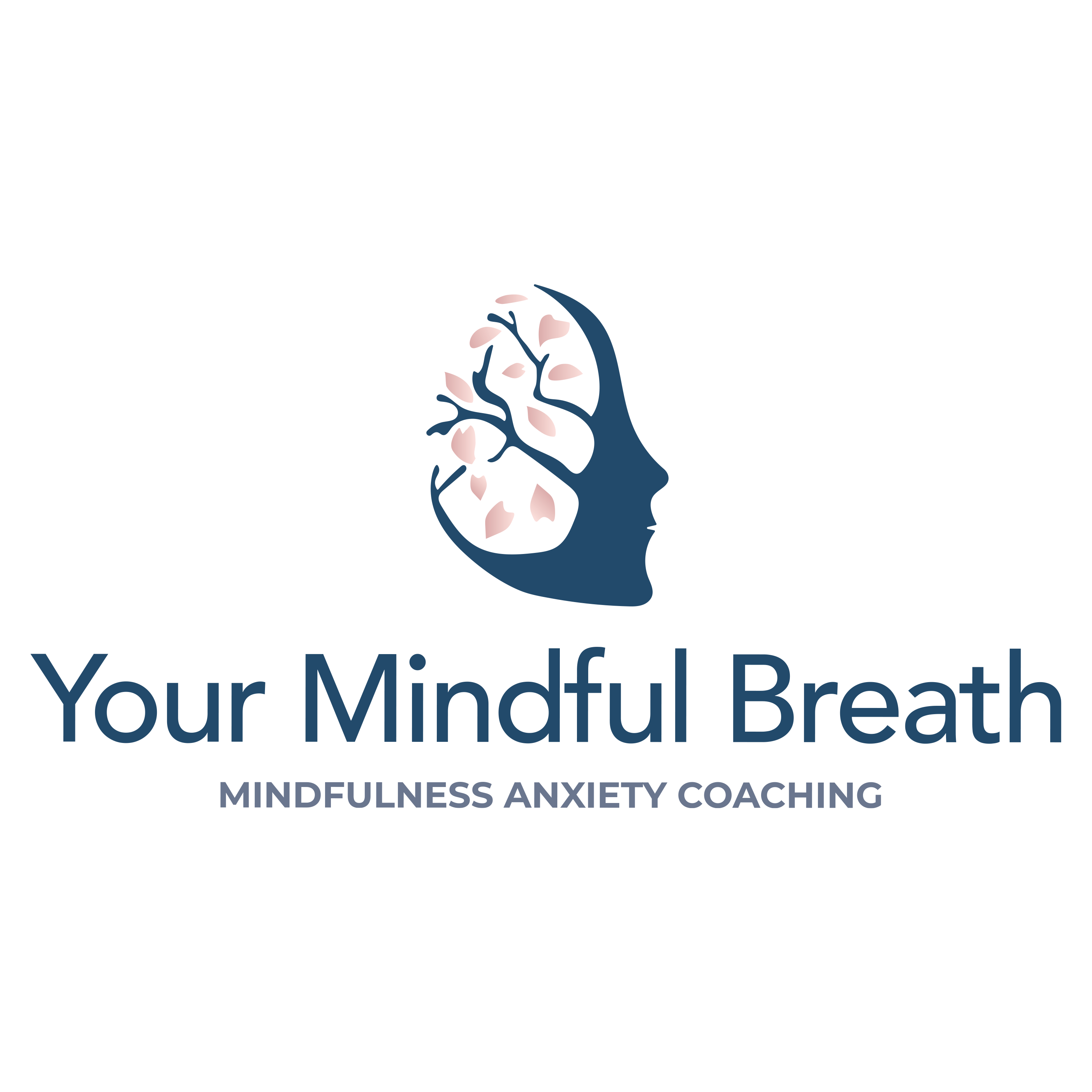Do you experience anxiety with the holiday season? When you think of the holidays perhaps you have an idealistic image of what they should look like.
Maybe you imagine all your loved ones gathering in one place, smiling and laughing together.
Or maybe you imagine a warm and cozy house, decorated with twinkling lights and a festive holiday meal waiting for you. That may be the first image that comes to mind or what you hope to experience this holiday season.
However, as the holidays get nearer you may start to notice a feeling of dread, doubt or fear start to creep in.
- What if the food burns or tastes awful?
- Did you get the wrong gift for your loved one?
- What if your disagreeable uncle tries to tell you about all the things you’re doing wrong?
Before you know it, you’re spiraling with tons of anxious thoughts and feelings about this holiday season.
This is very much me. I love the ideal holiday season I picture in my head. I love the holiday cheer it brings and when everyone is jolly and cheerful. But the reality is that it is not how every holiday season looks. When we hold ourselves to a certain standard of what the holidays “should” look like we can sometimes put unnecessary pressure and anxiety on ourselves.
If you find yourself in a similar situation where anxiety is starting to take over your thoughts about the upcoming holidays, here are 5 reminders to help you to feel more peace, calm and connected:
1. It’s Okay to Feel Anxiety This Holiday Season
The first reminder is that it is okay to feel anxious about the holidays. There is a lot of baggage (sometimes literally) that comes with the holidays. It’s natural to feel some anxiety about it.
However, just because you experience anxiety does not mean that you can’t have a joyful and relaxing holiday season. It only means that may you need to give yourself some extra grace, patience, and compassion as you navigate this time of year.
When you can learn to accept and become mindful of how you’re feeling in the moment, you allow yourself to tune into the ways that you can show yourself compassion.
When you feel anxious, take a moment to pause and acknowledge how you’re feeling. Close your eyes and notice where or how it’s showing up in your mind or body.
- Is your anxiety showing up in continuous rumination of planning or what could go wrong during the holidays?
- Or is it physical discomfort like tension or tightness in the body, trouble breathing, an upset tummy, or something else?
- Or maybe it’s a combination of both or something completely different. No matter what you’re feeling or thinking this holiday season, it’s valid.
Anxiety is never JUST in your head. It could be layered deep in your physical body and your brain’s neural pathways and you don’t even realize it.
This is why it’s so important to start tuning in and validating your feelings.
When you begin to validate your feelings and thoughts, you empower yourself to make choices from a place of self-compassion and understanding instead of self-judgment and fear. From this place, you can begin to develop a plan on how to best take care of yourself during the holiday season.
2. Create a Holiday Anxiety Plan
The second reminder is to outline a plan for you and your anxiety this holiday season. This may sound daunting if you’re already feeling anxious but having a plan can help to ease your anxiety.
Let’s build one out together.
Step 1: Take what you learned in the first reminder of acknowledging and validating your feelings and start to notice any patterns of where and when feelings of anxiety show up for you.
Consider free-writing all the things that activate or contribute to your anxiety during the holidays. This could include anything from family dynamics, travel plans, holiday parties, or even just the added pressure to make everything “perfect.”
Step 2: Once you have a good understanding of what may be sparking your anxiety, begin to brainstorm possible solutions for each one.
For example, if large family gatherings are overwhelming for you, consider attending for a shorter period or maybe even host the gathering at your house so you have more control over the environment.
If travel plans are a source of anxiety, consider breaking the trip down into smaller chunks so you’re not gone for long periods, or plan to arrive a day early so you’re not rushed.
And finally, if the pressure to make everything “perfect” is a source of anxiety for you, try to focus on enjoying the experience and being present in the moment rather than worrying about what could go wrong. This is easier said than done, but keep reading down below for some additional reminders and tips to help you with this.
Step 3: Come up with at least 1 backup plan in case something goes wrong. This will help you if something doesn’t go as planned. Consider how you might support yourself if things don’t go to plan.
For example, if you can’t host the family gathering at your house, maybe you can offer to help with set up or clean up so you’re not in the thick of things the whole time.
If your travel plans get disrupted, consider making the best of it and turning it into an adventure. Maybe this means taking a detour to explore somewhere new or finding some fun local activities to do.
Or perhaps ways that you will support yourself when things don’t go according to the plan is simply holding yourself in love and compassion. Or maybe it’s diving into some of your favorite self-care activities.
The key is to make a plan that works for YOU and YOUR needs. This will look different for everyone but the goal is to have a plan in place so you can reduce as much holiday-induced anxiety as possible.
When you have a plan in place, it helps to ease the anxious mind because you know there is a road map to follow. This can help to lessen the feeling of being overwhelmed by the holiday season.
3. Boundaries Are Your Holiday Anxiety’s Best Friend
The third reminder is to set boundaries. Often we think of boundaries as a negative thing but when it comes to managing anxiety during the holidays, boundaries can be a lifesaver.
Let’s face it, the holiday season is a busy time and can be quite overwhelming. If you’re someone who struggles with anxiety, it’s important to set boundaries around your time and energy. This means saying “no” to things that you don’t want to do, or that will drain your energy.
It’s also important to set boundaries around people. If there are certain family members or friends who activate your anxiety, it’s okay to limit the time you spend with them or even take a break from seeing them all together.
The key is, to be honest, direct, and assertive in your communication. This can be difficult if you’re not used to setting boundaries but it’s important to remember that your well-being is a priority.
Consider having a few phrases like this when that weird uncle starts to ask you too intrusive questions or you just don’t want to do or talk about something:
- “I’m not comfortable discussing that right now.”
- “I love you and I’m grateful for our relationship but I need some space right now.”
- “I’d prefer not to talk about that.”
- “No thank you, I’m not interested.”
Of course, you can always tailor these phrases to fit your needs but the key is to be direct and assertive in your communication.
Remember, you have a right to set boundaries and it’s important to do what’s best for YOU. So don’t be afraid to set those boundaries and stick to them.
4. Combat Holiday Anxiety by Refilling Your Cup
You can’t show up for others or even as your best self when you are not taking time for yourself.
When you have anxiety you may not think you have enough time to take care of your own needs when there’s so much to do and so much to get done.
But the truth is, if you don’t take time for yourself, your body will decide for you. You’ll quickly become depleted, both physically and emotionally. This can lead to burnout and make your symptoms of anxiety even worse.
So make sure you are taking time for yourself, even if it’s just 10-15 minutes each day. Do something that fills YOUR cup and makes YOU feel good. This might look like practicing yoga or meditation, reading, taking a walk outside, taking a bath, journaling, listening to music, or anything else that brings you joy.
If you want to take this one step further, I like to prioritize self-care in 3 major categories. This helps to make sure I have a decent balance of self-care activities because sometimes the medicine we need isn’t the medicine we are always drawn to at first.
Category 1: Self-Care for the Mind –
When you’re feeling anxious or stressed out, your mind’s messaging is on overdrive. You need activities that counter this or help the mind slow down. Consider trying the following:
The purpose of this type of meditation is to help you create more space between your thoughts and reactions. It helps you to become aware of how you’re feeling without judgment so you can choose how to respond to your situations rather than react. For practice, try this short 5 minute meditation.
You can try this meditation to guide you through a mindful walking meditation. The other option is to practice on your own by bringing your attention to what it feels like to breathe in your body and how it feels to take each step. You can also tune into what you see around you and notice what this feels like. You can do mindful walking anywhere but all you really need is enough space to walk a few paces and turn around. Both options are great to try out.
-
Arts & Crafts
This is another great mindfulness exercise for the brain. It can also be a fun way to connect back to your childhood or to activities that take you from the thinking mind and instead to being in your physical body.
-
Muting Social Media
Yep, I said it. A person who creates content for social media I just told you to mute it. I love it, but like too much of anything, it can cause you to feel out of balance. This might show up as feelings of comparison, FOMO (fear of missing out), and even isolation. So if you find yourself mindlessly scrolling through your feed more often than not, it might be time for a break. Take some time away from social media and see how you feel.
Category 2: Self-Care for the Body
Do things that are good for your physical body. When you take care of your body, it takes care of you. Here are a few suggestions to help you take care of your physical body.
-
Move Your Body
This has been shown to help with symptoms of anxiety by releasing endorphins, improving sleep, and helping with concentration and decision-making. Consider full-body exercises such as yoga, walking, swimming, dancing, etc. Find something that you can find joy in doing, and do it!
Here’s a playlist of my at-home yoga flows you can try out for reducing anxiety and stress.
-
Aim For a Balanced Diet
You are what you eat! So make sure you’re fueling your body with things that will help it to function at its best. This includes eating plenty of fruits, vegetables, and whole grains as well as drinking lots of water.
-
Cold Showers
Everyone envisions a warm hot shower or a nice spa day, but sometimes all you really need is some nice cold water to help calm the anxious body. Research has shown that cold water exposure can help to decrease anxiety by reducing the heart rate and helping you to feel calmer. So if you can overcome the fear of a cold shower give it a shot. I’ll start with a hotter shower at the beginning and slowly work my way till it gets colder.
-
Getting Enough Sleep
One key component to having a great tomorrow is getting enough sleep tonight. The average person needs 7-9 hours of sleep per night, but most people don’t get that. Consider going to bed and waking up at the same time each day to help train your body when it’s time to sleep. Also, avoid using screens for at least an hour before you go to bed as the blue light can interfere with falling asleep.
Category 3: Self-Care for the Spirit / Heart
Do things that help you connect with yourself, with others, or higher purpose. These can also be activities that help you connect to your authentic self and feel more in alignment with your values.
These types of meditations are a great way to help shift your focus from your anxieties and instead direct compassion outward. In this type of meditation, you repeat phrases such as “may all beings be happy” or “may I be free from suffering.” This is a great practice to do when you find yourself feeling overwhelmed by the holiday season and its accompanying stressors. Try this one here!
-
Volunteering or Supporting a Cause You Care About
Believe it or not, when you give back to others or support causes you care about, you end up feeling good yourself. This is because you are connecting with something bigger than yourself and your problems. Doing things for others can help you to feel more connected and purposeful, two things that are essential for managing anxiety.
Last blog post was focused all on the benefits of embracing your inner child and 10 ways you can start embracing your inner child. Check out that post here.
-
Spending Time in Nature
There is something about nature that can calm and soothe us. Maybe it’s the fresh air, the beauty of the surroundings, or the simplicity of being in the moment. Whatever it is, make time for it! Spend time walking in the park, sitting by a lake, or even just looking at pictures of nature scenes.
- Practice Gratitude
When we are feeling anxious, it’s easy to get caught up in all of the things that are going wrong in our lives. However, this only serves to fuel our anxiety further. Instead, try practicing gratitude by taking some time each day to think about or write down things you are thankful for. This can help shift your focus and improve your outlook.
What’s Next?
Now that you know about the 3 different categories of self-care and how important they are to prioritize this holiday season, return to that second reminder and re-evaluate your plan.
Did you schedule enough time to care for your needs and do the things you need to replenish your cup? If not, make some adjustments. This may mean saying “no” to some invitations or cutting back on the number of holiday parties you attend.
Consider scheduling self-care activities for after the holidays. Then, you have something to look forward to and are taking purposeful action to refill your cup after the busy holiday season.
It’s important to remember that to help you feel your best, you must actively work on prioritizing self-care in all three of the categories. This will help communicate to your mind, body, and heart that you are okay and that it is safe for you to relax and be at peace.
5. Let Go of the Things You Can’t Control To Reduce Your Holiday Anxiety
Whether you like it or not, your holiday season isn’t going to go exactly as planned. This last reminder is probably one of the most important reminders to help you keep your peace this holiday season.
And I know, for anxious people or people who don’t like uncertainty or when things veer from the plan, this can be so difficult!!!
Believe me, I understand this!
I am often the one creating my feelings of discomfort or pain because I get too attached to the plan or the idea of everything needing to be “perfect.”
When we can learn to let go of the deviations from the plan or the small things, we can create that perfect holiday season we desire.
Because ultimately, what we want is to feel happy, peaceful, and connected to our loved ones.
And when we focus on those things that truly matter, everything else falls into place.
So this holiday season, let go of the need for everything to be perfect and focus on what matters: your happiness and peace of mind.
Do You Need Some Support with Holiday Anxiety?
If you need some support this holiday season and you’re interested to dip your toes into some mindful movement and meditation for your mental wellness, check out my 4-Day Meditate and Move for Mental Wellness Challenge.
Each day’s challenge is around 30 minutes. You can expect to learn the following:
- Practical Mindfulness Tools you can utilize immediately to help you be more resilient during difficult or uncertain times.
- Creative & Fun Exploration 💡 ideas of moving and being in your structure in a way that feels good and safe for you.
- Easy Breath Techniques 😮💨 to regulate your nervous system, ground you in the present moment, and relax the mind.
This 4 day challenge is self-paced. Try this a week or two before your holiday stress sets in so you have the time and energy to practice and implement these tools. This can also be a great challenge to try after the holidays to ease back into your routine with less anxiety and stress.
Grab this 4-Day Meditate and Move for Mental Wellness Challenge here.
Since you’re a beloved member of the YMB community, here’s a 50% of coupon code for you. Just use promotional code “YMBNewsletter” at checkout to grab this challenge for less than the price of a coffee!
If you have any questions, don’t hesitate to reach out or comment down below!
I hope these five reminders help support you in having a more peaceful and enjoyable holiday season!





